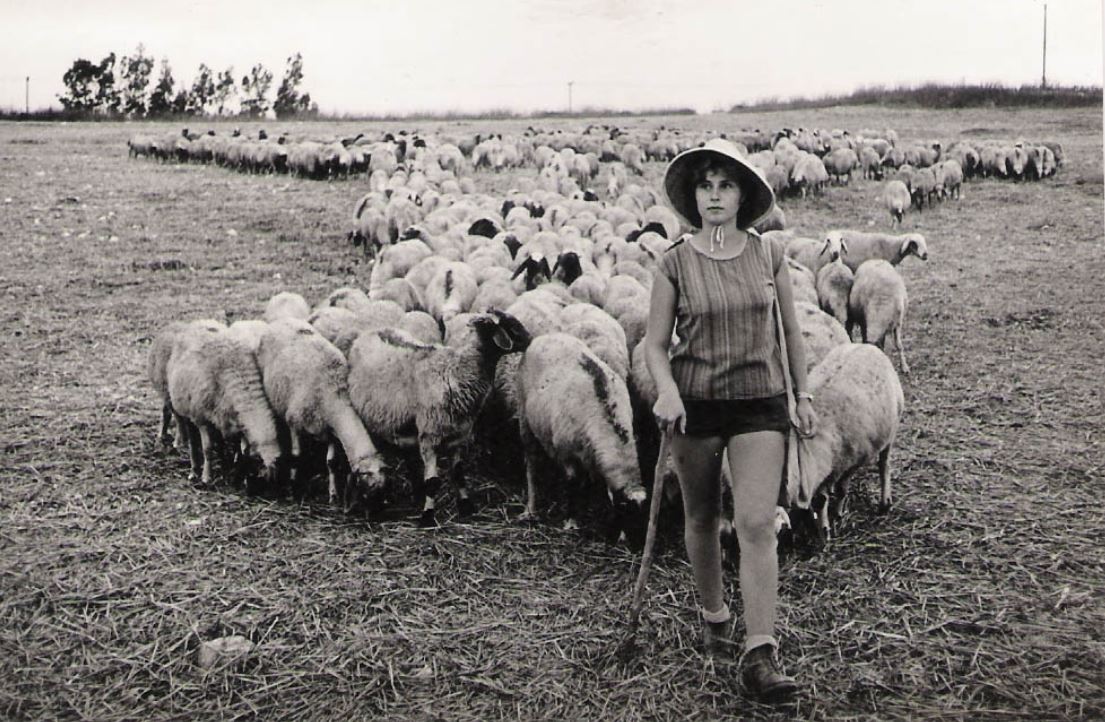This week’s learning is sponsored for the merit and safety of Haymanut (Emuna) Kasau, who was 9 years old when she disappeared from her home in Tzfat two years ago, on the 16th of Adar, 5784 (February 25, 2024), and whose whereabouts remain unknown.
This week’s learning is dedicated of the safety of our nation, the soldiers and citizens of Israel, and for the liberation of the Iranian people. May we soon see the realization of “ליהודים היתה אורה ושמחה וששון ויקר”.
This week’s learning is sponsored for the merit and safety of Haymanut (Emuna) Kasau, who was 9 years old when she disappeared from her home in Tzfat two years ago, on the 16th of Adar, 5784 (February 25, 2024), and whose whereabouts remain unknown.
Want to dedicate learning? Get started here:


Today’s daily daf tools:
This week’s learning is sponsored for the merit and safety of Haymanut (Emuna) Kasau, who was 9 years old when she disappeared from her home in Tzfat two years ago, on the 16th of Adar, 5784 (February 25, 2024), and whose whereabouts remain unknown.
This week’s learning is dedicated of the safety of our nation, the soldiers and citizens of Israel, and for the liberation of the Iranian people. May we soon see the realization of “ליהודים היתה אורה ושמחה וששון ויקר”.
This week’s learning is sponsored for the merit and safety of Haymanut (Emuna) Kasau, who was 9 years old when she disappeared from her home in Tzfat two years ago, on the 16th of Adar, 5784 (February 25, 2024), and whose whereabouts remain unknown.
Today’s daily daf tools:
Delve Deeper
Broaden your understanding of the topics on this daf with classes and podcasts from top women Talmud scholars.
New to Talmud?
Check out our resources designed to help you navigate a page of Talmud – and study at the pace, level and style that fits you.
The Hadran Women’s Tapestry
Meet the diverse women learning Gemara at Hadran and hear their stories.
Bekhorot 57
וְאַזְדָּא רַבִּי יוֹחָנָן לְטַעְמֵיהּ, דְּאָמַר רַבִּי אַסִּי אָמַר רַבִּי יוֹחָנָן: הָאַחִין שֶׁחָלְקוּ — לָקוֹחוֹת הֵן, וּמַחְזִירִין זֶה לָזֶה בַּיּוֹבֵל.
And Rabbi Yoḥanan follows his established line of reasoning in this regard. As Rav Asi says that Rabbi Yoḥanan says: Brothers who divided real estate received as an inheritance are considered purchasers who have purchased from each other, and as purchasers of land they must return the portions to each other in the Jubilee Year, at which point they may redistribute the property. This demonstrates that Rabbi Yoḥanan does not hold that it is retroactively established that each brother’s portion was designated for him upon their father’s death. Rather, it is considered as though all the land was joint property until the brothers traded or bought their respective portions from each other.
וּצְרִיכִי, דְּאִי אַשְׁמְעִינַן הָכָא, בְּהָא קָאָמַר רַבִּי יוֹחָנָן דּוּמְיָא דְּבִנְךָ, מָה בִּנְךָ בְּבָרוּר לָךְ, אַף שׁוֹרְךָ וְצֹאנְךָ בְּבָרוּר לָךְ; אֲבָל שָׂדֶה מֶכֶר הוּא דְּאָמַר רַחֲמָנָא לֶיהְדַּר בְּיוֹבֵל, יְרוּשָּׁה וּמַתָּנָה לָא!
The Gemara notes: And both statements of Rabbi Yoḥanan are necessary. As, if he had taught this halakha to us only here, with regard to animal tithe, one might have thought that it is in this case that Rabbi Yoḥanan says each one has not received his own portion. This is because the case must be similar to the case of your firstborn son, in accordance with the juxtaposition between the two cases. Just as your firstborn son is redeemed only if it is clear to you that he is your son, not if he is purchased from another, so too, your cattle and your sheep are subject to animal tithe only if it is clear to you, i.e., if there is no aspect of acquisition at all. But in the case of a field, one might think it is only with regard to a field that is sold that the Merciful One states that the purchaser should return it in the Jubilee Year, whereas a field that is an inheritance or a gift need not be returned.
וְאִי אַשְׁמְעִינַן שָׂדֶה — לְחוּמְרָא, אִי נָמֵי לְכַתְּחִלָּה, אֲבָל הָכָא — אֵימָא לָא, צְרִיכָא.
And if Rabbi Yoḥanan had taught us only the halakha that a field inherited by two brothers must be returned in the Jubilee Year, one might have thought that Rabbi Yoḥanan was uncertain and therefore ruled to be stringent. If so, he would rule stringently with regard to animal tithe as well, deeming the brothers liable. Alternatively, one might think Rabbi Yoḥanan rules in this manner with regard to returning fields in the Jubilee Year only because the field must return to how it was in the beginning. But here, in the case of animal tithe, where there is no requirement to return matters to their initial state, one might say that the brothers are not considered to be purchasers, but rather each received the animals that were retroactively designated for him and they are therefore obligated in animal tithe. For this reason it is necessary for Rabbi Yoḥanan to teach both cases.
מֵיתִיבִי: וְכֵן הַשּׁוּתָּפִין שֶׁחָלְקוּ, אֶחָד נָטַל עֲשָׂרָה וְאֶחָד נָטַל תִּשְׁעָה וָכֶלֶב — שֶׁכְּנֶגֶד הַכֶּלֶב אֲסוּרִין, שֶׁעִם הַכֶּלֶב מוּתָּרִים. וְאִם אָמְרַתְּ יֵשׁ בְּרֵירָה, לִיבְרוֹר חַד מִינַּיְיהוּ לְבַהֲדֵי כֶלֶב וְלִשְׁקוֹל, וְהָנָךְ לִישְׁתְּרוֹ!
The Gemara raises an objection from a baraita against the opinion that there is retroactive designation of the animals: And similarly in the case of two partners who divided their common property, and one took ten lambs and the other one took nine lambs and a dog, sacrificing any of the ten lambs taken in exchange for the dog is prohibited. This is because they are considered “the price of a dog,” as it states in the Torah (Deuteronomy 23:19), since they were given in exchange for it. Nevertheless, the nine lambs that were taken with the dog are permitted for sacrifice. The Gemara explains the objection: And if you say that there is retroactive designation, why are all ten lambs prohibited? Let him select one of the lambs to correspond to the dog and take it away, and all the rest of these lambs should be permitted.
אָמַר רַב אָשֵׁי: אִי דְּשָׁווּ כּוּלְּהוּ לַהֲדָדֵי — הָכִי נָמֵי, הָכָא בְּמַאי עָסְקִינַן? דְּלָא שָׁווּ כּוּלְּהוּ לַהֲדָדֵי, וְשָׁוֵי הַאי כַּלְבָּא חַד וּמַשֶּׁהוּ, וְהַאי מַשֶּׁהוּ מָשֵׁיךְ וְאָתֵי בְּכוּלְּהוּ.
Rav Ashi said: If this is referring to a case where they are all equal in value to each other, indeed one may consider only one of the lambs as corresponding to the dog. Here, we are dealing with a case where they are not all equal in value to each other, but the value of this dog is one and a small amount more than the value of each one of the ten lambs. Therefore, one cannot set aside a single lamb in exchange for the dog, and consequently one draws this extra small amount, i.e., the additional value of the dog, and divides it between all of the other nine lambs. As a result, all ten lambs are prohibited, since part of the price of a dog is included in each of them.
מַתְנִי׳ הַכֹּל נִכְנָסִין לַדִּיר לְהִתְעַשֵּׂר, חוּץ מִן כִּלְאַיִם, וּטְרֵפָה, וְיוֹצֵא דּוֹפֶן, וּמְחוּסַּר זְמַן, וְהַיָּתוֹם. וְאֵיזֶהוּ יָתוֹם? כֹּל שֶׁמֵּתָה אִמָּהּ שֶׁנִּשְׁחֲטָה וְאַחַר כָּךְ יָלְדָה. רַבִּי יְהוֹשֻׁעַ אוֹמֵר: אֲפִילּוּ נִשְׁחֲטָה אִמָּהּ וְהַשֶּׁלַח קַיָּים — אֵין זֶה יָתוֹם.
MISHNA: All cattle, sheep, and goats enter the pen to be tithed, except for an animal crossbred from diverse kinds, e.g., a hybrid of a goat and a sheep; a tereifa; an animal born by caesarean section; one whose time has not yet arrived, i.e., that is younger than eight days old, which is when animals become eligible for sacrifice; and an orphan. And what is an orphan? It is any animal whose mother died or was slaughtered while giving birth to it and thereafter completed giving birth to it. Rabbi Yehoshua says: Even if its mother was slaughtered but its hide exists at birth, i.e., if the mother’s hide is present after the birth, this is not an orphan.
גְּמָ׳ מְנָא הָנֵי מִילֵּי? דְּתָנוּ רַבָּנַן: ״שׁוֹר אוֹ כֶשֶׂב״ — פְּרָט לְכִלְאַיִם, ״אוֹ עֵז״ — פְּרָט לְנִדְמֶה, ״כִּי יִוָּלֵד״ — פְּרָט לְיוֹצֵא דוֹפֶן, ״וְהָיָה שִׁבְעַת יָמִים״ — פְּרָט לִמְחוּסַּר זְמַן, ״תַּחַת אִמּוֹ״ — פְּרָט לְיָתוֹם.
GEMARA: The Gemara asks: From where are these matters, i.e., the fact that those animals are not included in the animal tithe, derived? The Gemara answers: As the Sages taught in a baraita that discusses offerings in general: “When a bull or a sheep or a goat is born, then it shall be seven days under its mother, but from the eighth day onward it may be accepted for an offering made by fire to the Lord” (Leviticus 22:27). The phrase “a bull or a sheep” serves to exclude an animal born from diverse kinds; “or a goat” serves to exclude an animal that resembles another, e.g., a sheep that is the offspring of two sheep but which looks like a goat, or vice versa; “when…is born” serves to exclude an animal born by caesarean section; “then it shall be seven days” serves to exclude an animal whose time has not yet arrived; “under its mother” serves to exclude an orphan.
רַבִּי יִשְׁמָעֵאל בְּנוֹ שֶׁל רַבִּי יוֹחָנָן בֶּן בְּרוֹקָה אוֹמֵר: נֶאֱמַר כָּאן ״תַּחַת הַשָּׁבֶט״, וְנֶאֱמַר לְהַלָּן ״תַּחַת אִמּוֹ״. מָה לְהַלָּן — פְּרָט לְכׇל הַשֵּׁמוֹת הַלָּלוּ, אַף כָּאן — פְּרָט לְכׇל הַשֵּׁמוֹת הַלָּלוּ. וּמָה כָּאן — פְּרָט לִטְרֵפָה, אַף לְהַלָּן — פְּרָט לִטְרֵפָה.
The baraita continues: From where is it derived that these halakhot also apply to animal tithe? Rabbi Yishmael, son of Rabbi Yoḥanan ben Beroka, says it is learned by a verbal analogy from the term “under.” It is stated here, with regard to animal tithe: “Whatever passes under the rod” (Leviticus 27:32), and it is stated there, with regard to all offerings: “Under its mother” (Leviticus 22:27). Just as there, in the case of all offerings, the verse serves to exclude all these categories, so too here, with regard to animal tithe, the verse serves to exclude all these categories. And just as here, with regard to animal tithe, the verse serves to exclude a tereifa, as the verse states: “Whatever passes under the rod,” and a tereifa is unable to pass unaided, so too there, with regard to all offerings, the verse serves to exclude a tereifa.
״הַכֹּל״, לְאֵיתוֹיֵי מַאי? לְאֵיתוֹיֵי הָא דְּתָנוּ רַבָּנַן: הָרוֹבֵעַ, וְהַנִּרְבָּע, וְהַמּוּקְצֶה, וְהַנֶּעֱבָד, וְהָאֶתְנַן, וְהַמְחִיר, וְטוּמְטוּם, וְאַנְדְּרוֹגִינוֹס — כּוּלָּן נִכְנָסִין לַדִּיר לְהִתְעַשֵּׂר. רַבִּי שִׁמְעוֹן בֶּן יְהוּדָה אוֹמֵר מִשּׁוּם רַבִּי שִׁמְעוֹן: טוּמְטוּם וְאַנְדְּרוֹגִינוֹס אֵין נִכְנָסִין לַדִּיר לְהִתְעַשֵּׂר.
§ The Gemara asks: What does the mishna’s expansive term: All, serve to include? The Gemara answers that it serves to include this halakha that the Sages taught in a baraita: With regard to an animal that copulated with a person, or an animal that was the object of bestiality, or an animal that was set aside for idol worship, or one that was worshipped as a deity, or one that was given as payment to a prostitute or as the price of a dog, or a tumtum, i.e., an animal whose sexual organs are indeterminate, or a hermaphrodite, i.e., an animal displaying sexual organs of both sexes, all of these enter the pen to be tithed despite the fact that they are disqualified from being brought as offerings. Rabbi Shimon ben Yehuda says in the name of Rabbi Shimon: A tumtum and a hermaphrodite do not enter the pen to be tithed.
וְתַנָּא דִּידַן, אִי גָּמַר ״תַּחַת״ ״תַּחַת״ מִקֳּדָשִׁים — הָנֵי נָמֵי לָא, וְאִי לָא יָלֵיף — הָנֵי מְנָא לֵיהּ?
The Gemara raises a difficulty: But as for the tanna of our mishna, if he derives the verbal analogy of: “Under” (Leviticus 27:32), and: “Under” (Leviticus 22:27), from the verse referring to sacrificial animals, then these types listed in the baraita should also not enter the pen to be tithed, as they are all disqualified from being sacrificed. And if he does not derive the verbal analogy from sacrificial animals, from where does he derive the exemption of these categories listed in the mishna, e.g., one whose time has not yet arrived and an orphan?
לְעוֹלָם גָּמַיר, וְהָנֵי רַחֲמָנָא רַבִּינְהוּ, דִּכְתִיב: ״כִּי מׇשְׁחָתָם בָּהֶם מוּם בָּם לֹא יֵרָצוּ לָכֶם״, וְתָאנָא דְּבֵי רַבִּי יִשְׁמָעֵאל: כׇּל מָקוֹם שֶׁנֶּאֱמַר בּוֹ הַשְׁחָתָה, אֵינוֹ אֶלָּא דְּבַר עֶרְוָה וַעֲבוֹדָה זָרָה.
The Gemara answers: Actually, the tanna does derive the verbal analogy, but these categories listed in the baraita are included by the Merciful One in the animal tithe. As it is written with regard to those animals that may not be brought as offerings: “Neither from the hand of a foreigner shall you offer the bread of your God of any of these, because their corruption is in them, there is a blemish in them” (Leviticus 22:25). This verse indicates that corruption is considered a blemish, and the school of Rabbi Yishmael taught: Anywhere that the term: Corruption, is stated, it is a reference to nothing other than a matter of licentiousness and idol worship.
דְּבַר עֶרְוָה — דִּכְתִיב: ״כִּי הִשְׁחִית כׇּל בָּשָׂר אֶת דַּרְכּוֹ עַל הָאָרֶץ״, עֲבוֹדָה זָרָה — דִּכְתִיב: ״פֶּן תַּשְׁחִיתוּן וַעֲשִׂיתֶם לָכֶם פֶּסֶל תְּמוּנַת כׇּל סָמֶל תַּבְנִית זָכָר אוֹ נְקֵבָה״.
The baraita supports this claim: Corruption is a reference to a matter of licentiousness, as it is written with regard to the generation of the flood: “And God saw the earth, and behold, it was corrupt; for all flesh had corrupted their way upon the earth” (Genesis 6:12). And corruption is also a reference to idol worship, as it is written: “Lest you deal corruptly, and make you a graven image, the form of any figure, the likeness of male or female” (Deuteronomy 4:16).
וְכֹל שֶׁהַמּוּם פּוֹסֵל בּוֹ — דְּבַר עֶרְוָה וַעֲבוֹדָה זָרָה פּוֹסְלִין בּוֹ, וְכֹל שֶׁאֵין הַמּוּם פּוֹסֵל בּוֹ — אֵין דְּבַר עֶרְוָה וַעֲבוֹדָה זָרָה פּוֹסְלִין בּוֹ, וְהַאי מַעֲשֵׂר הוֹאִיל וְלָא פָּסֵיל בֵּיהּ מוּמָא, דִּכְתִיב: ״לֹא יְבַקֵּר בֵּין טוֹב לָרַע וְלֹא יְמִירֶנּוּ״ — דְּבַר עֶרְוָה וַעֲבוֹדָה זָרָה נָמֵי לָא פָּסֵיל בֵּיהּ.
And the juxtaposition of the word “corruption” with the word “blemish” in Leviticus 22:25 teaches that in any case where a blemish disqualifies an animal, a matter of licentiousness or a matter of idol worship also disqualifies it. And in a case where a blemish does not disqualify an animal, a matter of licentiousness or a matter of idol worship also does not disqualify it. And with regard to this animal tithe, since a blemish on an animal does not disqualify it, as it is written: “He shall not inquire whether it be good or bad, neither shall he change it” (Leviticus 27:33), a matter of licentiousness or a matter of idol worship also does not disqualify it.
רוֹבֵעַ וְנִרְבָּע — דְּבַר עֶרְוָה, מוּקְצֶה וְנֶעֱבָד — עֲבוֹדָה זָרָה, וְאֶתְנַן — דְּבַר עֶרְוָה, וּמְחִיר אִיתַּקַּשׁ לְאֶתְנַן,
The Gemara further explains that the categories listed in the baraita are either matters of licentiousness or matters of idol worship. An animal that copulated with a person and an animal that was the object of bestiality are both a matter of licentiousness. An animal that was set aside for idol worship and one that was worshipped are cases of idol worship. And an animal that was given as payment to a prostitute is a matter of licentiousness, and an animal used as the price of a dog is juxtaposed to an animal that was given as payment to a prostitute (see Deuteronomy 23:19).
טוּמְטוּם וְאַנְדְּרוֹגִינוֹס — קָסָבַר: סְפֵיקָא הוּא.
Finally, with regard to an animal that is a tumtum or a hermaphrodite, the tanna holds that it is uncertain whether it is male or female, not a creature unto itself, and therefore a tumtum is also subject to the tithe.
רַבִּי שִׁמְעוֹן בֶּן יְהוּדָה אוֹמֵר. קָסָבַר סְפֵיקָא הוּא, מִיעֵט רַחֲמָנָא גַּבֵּי קָדָשִׁים — זָכָר וַדַּאי וּנְקֵבָה וַדָּאִית, וְלֹא טוּמְטוּם וְאַנְדְּרוֹגִינוֹס. מַעֲשֵׂר נָמֵי גְּמַר ״תַּחַת״ ״תַּחַת״ מִקֳּדָשִׁים.
The baraita states that Rabbi Shimon ben Yehuda says in the name of Rabbi Shimon: A tumtum and a hermaphrodite do not enter the pen to be tithed. The Gemara explains: He holds that the case of an animal that is a tumtum or a hermaphrodite involves an uncertainty, and the Merciful One excluded cases of uncertainty with regard to sacrificial animals. Only a definite male or a definite female is fit to be sacrificed on the altar, but not a tumtum or a hermaphrodite. Consequently, with regard to animal tithe too, they do not enter the pen to be tithed, as he derives the verbal analogy of “under” and “under” from sacrificial animals.
תָּנוּ רַבָּנַן: הַכֹּל נִכְנָסִין לַדִּיר לְהִתְעַשֵּׂר, חוּץ מִן הַכִּלְאַיִם וְהַטְּרֵפָה, דִּבְרֵי רַבִּי אֶלְעָזָר בְּרַבִּי יְהוּדָה אִישׁ כְּפַר בַּרְתּוֹתָא שֶׁאָמַר מִשּׁוּם רַבִּי יְהוֹשֻׁעַ. אָמַר רַבִּי עֲקִיבָא: אֲנִי שָׁמַעְתִּי הֵימֶנּוּ אַף יוֹצֵא דּוֹפֶן וּמְחוּסַּר זְמַן וְיָתוֹם.
The Sages taught in a baraita: All animals enter the pen to be tithed except for an animal crossbred from diverse kinds, e.g., a hybrid of a goat and a sheep, and a tereifa; this is the statement of Rabbi Elazar, son of Rabbi Yehuda, of the village of Bartota, who said it in the name of Rabbi Yehoshua. Rabbi Akiva said: I heard from Rabbi Yehoshua that an animal born by caesarean section and an animal whose time has not yet arrived, i.e., that is less than eight days old, and an orphan animal, are also excluded from animal tithe.
וְתַנָּא קַמָּא, אִי גָּמַר ״תַּחַת״ ״תַּחַת״ מִקֳּדָשִׁים — הָנֵי נָמֵי לָא, וְאִי לָא גָּמַר, בִּשְׁלָמָא טְרֵפָה — ״כֹּל אֲשֶׁר יַעֲבֹר תַּחַת הַשָּׁבֶט״ כְּתִיב, פְּרָט לִטְרֵפָה שֶׁאֵינָהּ עוֹבֶרֶת, אֶלָּא כִּלְאַיִם מְנָא לֵיהּ?
The Gemara asks: And the first tanna of the baraita, what does he maintain? If he derives the verbal analogy of “under” and “under” from sacrificial animals, then these categories listed by Rabbi Akiva should also not enter the pen to be tithed. And if he does not derive the verbal analogy, granted, he rules that a tereifa does not enter the pen to be tithed, as it is written: “Whatever passes under the rod” (Leviticus 27:32), which excludes a tereifa, as it does not pass under the rod due to its physical state. But from where does he derive that an animal crossbred from diverse kinds does not enter the pen to be tithed?
לְעוֹלָם גָּמַר, וּבְיוֹצֵא דּוֹפֶן —
The Gemara answers: Actually, he does derive the verbal analogy of “under” and “under,” and therefore he excludes a tereifa and diverse kinds from the animal tithe. But with regard to an animal born by caesarean section
סָבַר לַהּ כְּרַבִּי שִׁמְעוֹן, דְּאָמַר: יוֹצֵא דּוֹפֶן — וָלָד מְעַלְּיָא הוּא, וּדְלָא כְּרַבִּי יוֹחָנָן.
he holds in accordance with the opinion of Rabbi Shimon, who says that a human child born by caesarean section is a full-fledged offspring and renders its mother ritually impure with the impurity of childbirth. Likewise, with regard to an animal born by caesarean section, he holds the birth was a proper birth and the animal may be brought as an offering, and therefore it also enters the pen to be tithed. And this is not in accordance with the opinion of Rabbi Yoḥanan, who holds that Rabbi Shimon concedes that an animal born by caesarean section is disqualified from being brought as an offering (see Nidda 40a).
בִּמְחוּסַּר זְמַן סָבַר לַהּ כְּרַבִּי שִׁמְעוֹן בֶּן יְהוּדָה, יָתוֹם — כְּגוֹן שֶׁהַשֶּׁלַח קַיָּים, וְרַבִּי יְהוֹשֻׁעַ לְטַעְמֵיהּ, דְּאָמַר: אֲפִילּוּ שָׁחַט אֶת אִמּוֹ וְהַשֶּׁלַח קַיָּים — אֵין זֶה יָתוֹם.
And with regard to an animal whose time has not yet arrived, this tanna holds in accordance with the opinion of Rabbi Shimon ben Yehuda, who maintains that the obligation of animal tithe applies to such an animal. As for an orphan animal, he is referring to a case where the mother’s hide exists at birth, i.e., the mother’s hide is present after the birth, and therefore the animal is not considered an orphan. And Rabbi Yehoshua, whose opinion this tanna follows, conforms to his standard line of reasoning, as he says: Even if its mother was slaughtered but its hide exists at birth, i.e., if the mother’s hide is present after the birth, this is not an orphan.
הֵעִיד רַבִּי יִשְׁמָעֵאל בֶּן סַתְרִיאֵל מֵעַרְקַת לִבְנָה לִפְנֵי רַבִּי: בִּמְקוֹמֵנוּ מַפְשִׁיטִין אֶת הַמֵּתָה וּמַלְבִּישִׁין אֶת הַחַי. אָמַר רַבִּי: נִתְגַּלָּה טַעְמָהּ שֶׁל מִשְׁנָתֵינוּ.
Rabbi Yishmael ben Satriel, from a place called Arkat Leveina, testified before Rabbi Yehuda HaNasi: In our locale, if an animal dies while giving birth they flay the dead mother’s skin and clothe the living newborn animal with it for protection. Rabbi Yehuda HaNasi said: This testimony of yours reveals the reason for the ruling of the mishna that if the hide of the mother still exists the offspring is not considered to be an orphan; the hide serves as a substitute for the mother.
חֲזֵירִין שֶׁבִּמְקוֹמֵנוּ יֵשׁ לָהֶם שִׁשִּׁים רִבּוֹא קְלָפִים בְּבֵית הֶמְסֵס שֶׁלּוֹ, פַּעַם אַחַת נָפַל אֶרֶז אֶחָד שֶׁבִּמְקוֹמֵנוּ, וְעָבְרוּ שֵׁשׁ עֶשְׂרֵה קְרוֹנוֹת עַל חוּדּוֹ אַחַת.
Rabbi Yishmael ben Satriel also testified before Rabbi Yehuda HaNasi: The lettuce in our locale has 600,000 leaves in its omasum, i.e., in its core. Rabbi Yishmael ben Satriel further testified before Rabbi Yehuda HaNasi: Once one cedar tree fell in our locale, and it was so wide that sixteen wagons passed over its back, meaning the width of its trunk, as one, i.e., side by side.
פַּעַם אַחַת נָפְלָה בֵּיצַת בַּר יוֹכָנִי, וְטִבְּעָה שִׁשִּׁים כְּרַכִּים, וְשִׁבְּרָה שְׁלֹשׁ מֵאוֹת אֲרָזִים. וּמִי שָׁדְיָא לֵיהּ? וְהָא כְּתִיב: ״כְּנַף רְנָנִים נֶעֱלָסָה״! אָמַר רַב אָשֵׁי: הָהוּא מוּזַרְתָּא הֲוַאי.
Rabbi Yishmael ben Satriel also testified before Rabbi Yehuda HaNasi: Once an egg of the bird called bar yokhani fell, and the contents of the egg drowned sixty cities and broke three hundred cedar trees. The Gemara asks: And does the bar yokhani bird throw its eggs to the ground? But isn’t it written: “The kenaf renanim bird rejoices, but are her wings and feathers those of the stork? For she leaves her eggs on the earth, and warms them in dust” (Job 39:13–14)? The Sages understood that kenaf renanim is another name for the bar yokhani bird. If so, how could its egg fall if it lays its eggs on the ground? Rav Ashi said in explanation: That egg was unfertilized, and since it would never hatch the bird threw it to the ground.
מַתְנִי׳ שָׁלֹשׁ גֳּרָנוֹת לְמַעְשַׂר בְּהֵמָה: בִּפְרַס הַפֶּסַח, וּבִפְרַס הָעֲצֶרֶת, וּבִפְרַס הֶחָג, וְהֵן גֳּרָנוֹת שֶׁל מַעְשַׂר בְּהֵמָה, דִּבְרֵי רַבִּי עֲקִיבָא.
MISHNA: There are three times during the year designated for gathering the animals that were born since the last date for animal tithe: Adjacent to Passover, and adjacent to Shavuot, and adjacent to Sukkot. And those are the gathering times for animal tithe; this is the statement of Rabbi Akiva.
בֶּן עַזַּאי אוֹמֵר: בְּעֶשְׂרִים וְתִשְׁעָה בַּאֲדָר, בְּאֶחָד בְּסִיוָן, בְּעֶשְׂרִים וְתִשְׁעָה בְּאָב. רַבִּי אֶלְעָזָר וְרַבִּי שִׁמְעוֹן אוֹמְרִים: בְּאֶחָד בְּנִיסָן, בְּאֶחָד בְּסִיוָן, בְּעֶשְׂרִים וְתִשְׁעָה בֶּאֱלוּל. וְלָמָה אָמְרוּ בְּעֶשְׂרִים וְתִשְׁעָה בֶּאֱלוּל וְלֹא אָמְרוּ בְּאֶחָד בְּתִשְׁרִי? מִפְּנֵי שֶׁהוּא יוֹם טוֹב, וְאִי אֶפְשָׁר לְעַשֵּׂר בְּיוֹם טוֹב — לְפִיכָךְ הִקְדִּימוּהוּ בְּעֶשְׂרִים וְתִשְׁעָה בֶּאֱלוּל.
Ben Azzai says the dates are: On the twenty-ninth of Adar, on the first of Sivan, and on the twenty-ninth of Av. Rabbi Elazar and Rabbi Shimon say that the dates are: On the first of Nisan, on the first of Sivan, and on the twenty-ninth of Elul. And why did Rabbi Elazar and Rabbi Shimon say the twenty-ninth of Elul, and why did they not say the first of Tishrei? It is due to the fact that the first of Tishrei is the festival of Rosh HaShana, and one cannot tithe on a Festival. Consequently, they brought it earlier, to the twenty-ninth of Elul.
רַבִּי מֵאִיר אוֹמֵר: בְּאֶחָד בֶּאֱלוּל רֹאשׁ הַשָּׁנָה לְמַעְשַׂר בְּהֵמָה. בֶּן עַזַּאי אוֹמֵר: הָאֱלוּלִים מִתְעַשְּׂרִים בִּפְנֵי עַצְמָן.
Rabbi Meir says: The beginning of the new year for animal tithe is on the first of Elul. Ben Azzai says: The animals born in Elul are tithed by themselves, due to the uncertainty as to whether the halakha is in accordance with the opinion of Rabbi Meir, i.e., that the new year begins on the first of Elul, or in accordance with the opinion of Rabbi Elazar and Rabbi Shimon, which would mean that the new year begins on the first of Tishrei.
כׇּל הַנּוֹלָדִים מֵאֶחָד בְּתִשְׁרִי עַד עֶשְׂרִים וְתִשְׁעָה בֶּאֱלוּל — הֲרֵי אֵלּוּ מִצְטָרְפִין. חֲמִשָּׁה לִפְנֵי רֹאשׁ הַשָּׁנָה וַחֲמִשָּׁה לְאַחַר רֹאשׁ הַשָּׁנָה — אֵינָן מִצְטָרְפִין. חֲמִשָּׁה לִפְנֵי הַגּוֹרֶן וַחֲמִשָּׁה לְאַחַר הַגּוֹרֶן — הֲרֵי אֵלּוּ מִצְטָרְפִין. אִם כֵּן, לָמָּה נֶאֶמְרוּ שָׁלֹשׁ גֳּרָנוֹת לְמַעְשַׂר בְּהֵמָה? שֶׁעַד שֶׁלֹּא הִגִּיעַ הַגּוֹרֶן — מוּתָּר לִמְכּוֹר וְלִשְׁחוֹט, הִגִּיעַ הַגּוֹרֶן — לֹא יִשְׁחוֹט, וְאִם שָׁחַט — פָּטוּר.
According to the opinion of Rabbi Elazar and Rabbi Shimon, with regard to all animals that are born from the first of Tishrei until the twenty-ninth of Elul, those animals join to be tithed together. If five were born before Rosh HaShana and five after Rosh HaShana, those animals do not join to be tithed together. If five were born before a time designated for gathering and five after that time designated for gathering, those animals join to be tithed together. If so, why were three times stated for gathering the animals for animal tithe? The reason is that until the time designated for gathering arrives it is permitted to sell and slaughter the animals. Once the time designated for gathering arrives one may not slaughter those animals before tithing them; but if he slaughtered an animal without tithing it he is exempt.
גְּמָ׳ מַאי שְׁנָא תְּלָת? אָמַר רַבָּה בַּר שֵׁילָא: לָקֳבֵל חוּרְפֵי, וְאַפְלֵי, וְקַיְיטֵי.
GEMARA: The mishna teaches that there are three times during the year designated for gathering the animals born since the last date for animal tithe. The Gemara asks: What is different about these dates, i.e., why are there specifically three times designated in the year? Rabba bar Sheila said: There are three times in order to collect the animals born early in winter, and the animals born later in spring, and the animals born in the summer.
וּמַאי שְׁנָא בְּהָנֵי זִימְנֵי? אָמַר רַבִּי תַּנְחוּם בְּרֵיהּ דְּרַב חִיָּיא אִישׁ כְּפַר עַכּוֹ:
The Gemara asks: And what is different about these three times, i.e., before Passover, Shavuot, and Sukkot, that they are chosen? Rabbi Tanḥum, son of Rav Ḥiyya, of the village of Akko, says:






































